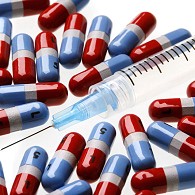Paris
20 October 2009
A group of researchers says an experimental AIDS vaccine trial in Thailand shows the shot has a modest but significant effect -- and that it offers hope for the future. Findings which were presented at an international AIDS vaccine conference in Paris.
 |
Half of the overall test group received the doses, while the other 8,000 people in the trial received a placebo. All the participants were given condoms and counseling for three years. The test found that those given the vaccine showed a 31 percent lower risk of infection than the others.
While initial results from the trial were reported in September, the full results were presented at the AIDS conference in Paris on Tuesday and reported in The New England Journal of Medicine. Dr. Supachai Rerks-Ngarm of the Department of Disease Control of the Thai Ministry's Public Health Department, was overall leader of the study.
"We are, as you may expect, encouraged by these results and look forward to undertaking further research to understand what it means, why the vaccine regimen was effective in some volunteers and how we might build upon these results in our collective research," he said.
Critics say the trial's results may have been accidental and whatever benefits the vaccine might produce may have limited effect. Some want an independent review. And the trial's researchers, like Dr. Nelson Michael, of the Walter Reed Institute of Research in the United States, say it's unclear what difference the findings will make for areas like Africa -- where rates of HIV/AIDS are much higher than among the test population and where there are many strains of the virus.
"Among the questions we have now, if we are to go forward in HIV vaccine development, will be the calculation of the transmission intensity? What will be the proper mix in different risk groups, in different subtypes, in different backgrounds if the goal is to reach a vaccine -- one vaccine -- that could work for all people and nations?" he asked.
But the researchers say the findings offer new hope for AIDS research. And Dr. Michael said South Africa, for one, appears interested in conducting a similar study.